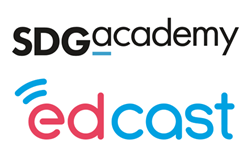Receiving a certification from the SDG Academy is a significant achievement that showcases an individual’s commitment to understanding and addressing the United Nations’ Sustainable Development Goals (SDGs). The SDG Academy offers a range of online courses and educational programs designed to equip learners with the knowledge and skills needed to contribute to sustainable development.
Obtaining a certification from the SDG Academy demonstrates a deep understanding of the interconnected challenges and opportunities related to sustainable development. It signifies an individual’s competence in applying the principles of sustainability, promoting social equity, and striving for environmental stewardship.
The certification programs offered by the SDG Academy cover a wide range of topics, including climate action, poverty eradication, gender equality, sustainable cities, responsible consumption, and many more. Learners gain valuable insights into the key concepts, frameworks, and strategies required to advance the SDGs at local, national, and global levels.
By completing a certification from the SDG Academy, individuals enhance their professional profile and increase their employability in various fields related to sustainability, development, policy-making, and advocacy. The certification serves as evidence of their dedication to sustainable practices and their ability to contribute meaningfully to sustainable development initiatives.
Furthermore, the certification from the SDG Academy fosters a global network of professionals and practitioners committed to the SDGs. It provides opportunities for collaboration, knowledge sharing, and collective action, enabling certified individuals to be part of a global community of change-makers.
Whether pursued by students, professionals, policymakers, or individuals passionate about sustainable development, a certification from the SDG Academy signifies a commitment to creating a more sustainable and equitable world. It reflects a dedication to lifelong learning and a desire to make a positive impact on society and the environment.
Overall, the certification from the SDG Academy serves as a testament to an individual’s expertise and dedication to advancing the SDGs. It opens doors to new opportunities, enables collaboration, and empowers individuals to be catalysts for positive change in their communities and beyond.
MOMODa FOUNDATION staff had been doing training online to acquire expertise in SDG implementations through the SDG academy EDX platform. One of us has already finished the certification of the following course.
How to Achieve the Sustainable Development Goals
The world has adopted an ambitious agenda, the Sustainable Development Goals, to end poverty, protect the planet, and ensure prosperity for all. Learn how we can achieve these goals through careful planning and engagement of diverse stakeholders.
Institution
SDGAcademyX
Subject:
Environmental Studies
On September 25, 2015, the United Nations General Assembly adopted the 2030 Agenda for Sustainable Development, along with a new set of goals collectively called the Sustainable Development Goals (SDGs). This ambitious agenda is a call to action to end poverty, protect the planet, and ensure that all people enjoy peace and prosperity.
This course on How to Achieve the SDGs provides an in-depth look at planning for SDG implementation. The range of topics covers financing, policy development, roles of stakeholders, and more. A comprehensive understanding of the societal transformations needed to achieve the SDGs is conveyed.
This course is for:
Policy professionals who want to understand frameworks for SDG planning.
Sustainable development practitioners seeking knowledge on goals-based development.
Advanced undergraduates and graduate students interested in key concepts related to the SDGs
- The scale, scope, and establishment of the Sustainable Development Goals
- The societal transformations required to meet the SDGs
- The governance, planning, and financing essential for progress
- The role of civil society and the business sector in advancing global development
- The types of transboundary cooperation needed to achieve global goals
Module 1: The SDG Framework and Agenda 2030
- Chapter 1: Scale and Scope of the SDGs
- Chapter 2: A Brief History of the SDGs
- Chapter 3: Transformation Challenges
- Chapter 4: Differential Diagnosis
- Chapter 5: Structures of Power and decision making
Module 2: Transformation Pathways to Success
- Chapter 1: Education, Inclusion, Jobs, and Growth
- Chapter 2: Health and Wellbeing
- Chapter 3: Clean Energy and Industry
- Chapter 4: Sustainable Food and Land Use
- Chapter 5: Smart Cities and Transport
- Chapter 6: Digital Technologies and E-Governance
Module 3: Government and the SDGs
- Chapter 1: Planning and Back-casting
- Chapter 2: Organizing Government for the SDGs
- Chapter 3: SDG Policy Instruments
- Chapter 4: SDG Pathways: The Case of Deep Decarbonization
- Chapter 5: Industrial Policies and the SDGs
Module 4: SDG Financing
- Chapter 1: Needs Assessments: estimating resource needs for the SDGs
- Chapter 2: Types of Financing
- Chapter 3: Capital Markets and the SDGs
- Chapter 4: New financing mechanisms and Global Funds
- Chapter 5: Development financing for the SDGs.
Module 5. The Business Sector and the SDGs
- Chapter 1. The Role of Business in the SDGs
- Chapter 2. Shareholders and Stakeholders
- Chapter 3. Global Value Chains
- Chapter 4. Unsustainable Industries
- Chapter 5. Public-Private-Civil Society Partnerships
Module 6. Civil Society and the SDGs
- Chapter 1. Public awareness and Consumer Activism
- Chapter 2. Data for Accountability and Decision-making
- Chapter 3. Investor Activism
- Chapter 4. Litigation and Human Rights
- Chapter 5. Social business, CSOs, and operations where the government is weak
Module 7: Global Partnerships for the SDGs
- Chapter 1: Development Assistance
- Chapter 2: Other Dimensions of Global Partnership
- Chapter 3: The Role of Universities and SDSN
- Chapter 4: Moral Advocacy: Religious Leaders
- Chapter 5: Cross-Border Cooperation
- Chapter 6: The World in 2030: Mapping a path forward
